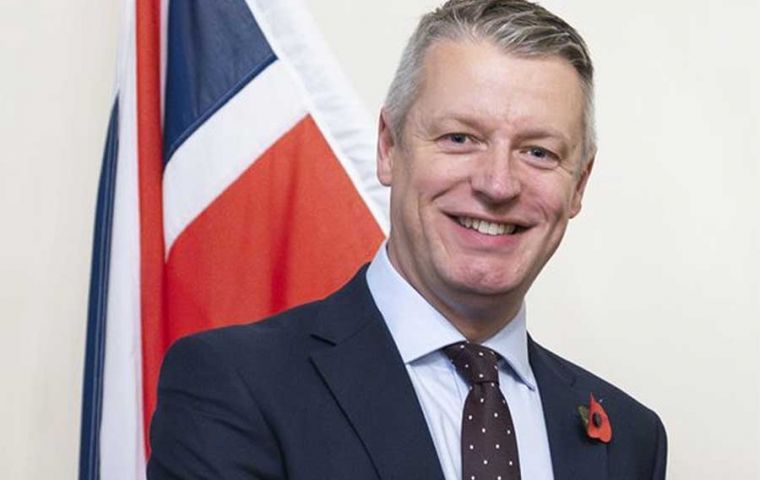MercoPress. South Atlantic News Agency
“Falklands are British”, an unequivocal message from UK Minister for the Armed Forces
 Luke Pollard MP, UK Minister for the Armed Forces and MP for Plymouth Sutton and Devonport
Luke Pollard MP, UK Minister for the Armed Forces and MP for Plymouth Sutton and Devonport Plymouth has a long and rich naval history. It is celebrated as where Sir Francis Drake played bowls as the Spanish Armada loomed in 1588 and as a key embarkation point for invading Allied forces on D-Day. However, the city’s critical role in the Falklands War is perhaps less widely appreciated.
During the spring of 1982, personnel at Plymouth’s Devonport dockyard worked 24 hour shifts to prepare ships for the long journey ahead. The whole community pulled together to support them, and it was Royal Navy, Royal Marines and Army units deployed from Plymouth that were involved in some of the fiercest fighting once they arrived in the South Atlantic.
As MP for Plymouth Sutton and Devonport, and the son of a Royal Navy submariner, I have always felt a special affinity with the Falklands. Two years ago, I had the honor of meeting many veterans when I organized a series of events in my constituency to commemorate the 40th anniversary of the war, and Plymouth’s integral part in the Islands’ liberation.
I first visited the Falklands in 2018 and saw the pride the local people have in their Islands, their communities and their sovereignty. This week, as part of the first visit to the Islands by the new Government and first defense minister since 2022, I’ll be meeting Governor Alison Blake alongside Members of the Legislative Assembly, and some of the defense personnel currently serving in the South Atlantic. I’ll be attending the Royal British Legion Poppy Ball and the Service of Remembrance on Sunday at Christchurch Cathedral to commemorate the heroes who made the ultimate sacrifice in 1982.
Of the 26,000 British troops who fought, 255 tragically lost their lives. I’ll also bring with me an unequivocal message: the Falkland Islands are British, and they will remain British for as long as the Islanders wish. In the 2013 referendum, an overwhelming 99.8% voted to remain as an overseas territory of the UK. Your right of self-determination is enshrined in the UN Charter and a UN Covenant on Human Rights. We look forward to building a productive relationship with Argentina as a fellow G20 partner, but our position on the Falklands is unwavering.
This approach underpins the package of South Atlantic co-operation announced by the British Foreign Secretary David Lammy and former Argentine Foreign Minister Diana Mondino in September this year. Collaboration is the way forward, offering great benefits to the Islands, Argentina and the UK. Since the conflict, the Islands have gone from strength to strength. Today, 3,600 people with over 60 nationalities call the Falklands home. You have built a vibrant economy, and formed a modern, diverse community. And you will choose your own future. I’m greatly looking forward to revisiting the Falklands this week.
As Devonport’s MP, I’ll remember the momentous contribution made by people I represent 42 years ago and as Minister for the Armed Forces, I’ll remember the courage of service personnel who fought to liberate the Islands. Sadly, many veterans of the Falklands War have passed in recent years. But we must never forget their place in history. We must continue to tell their story, because understanding our past is the best way to prepare for the future. “We will remember them.”




Top Comments
Disclaimer & comment rules-

-

-

Read all commentsWho is this idiot above ?, has he escaped from a lunatic asylum, ? Britain not England is not in decline, the Falklands are self governing territory and not a colony, they will not cut ties , and will never be Argentine, clearly you know nothing,
Nov 08th, 2024 - 10:50 am +5Giving a non-self-governing territory to another State without the consent of its inhabitants would be a denial of human rights and contravene the UN Charter. Falklands – Freely Determined Political Status (1 pg):
Nov 08th, 2024 - 11:12 am +5https://www.academia.edu/36555342/Falklands_-_Freely_Determined_Political_Status.pdf
Everything you posted Bras is 100% wrong and not remotely reality,
Nov 08th, 2024 - 01:34 pm +5Commenting for this story is now closed.
If you have a Facebook account, become a fan and comment on our Facebook Page!